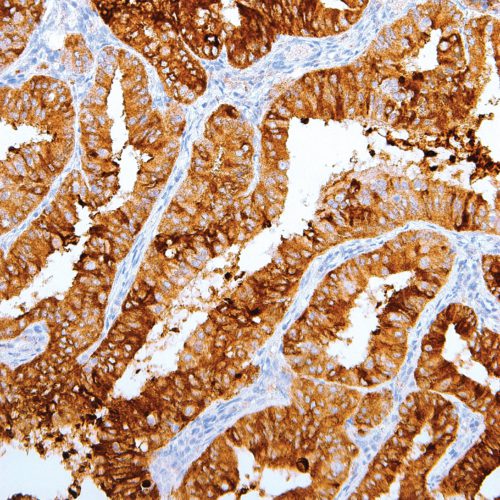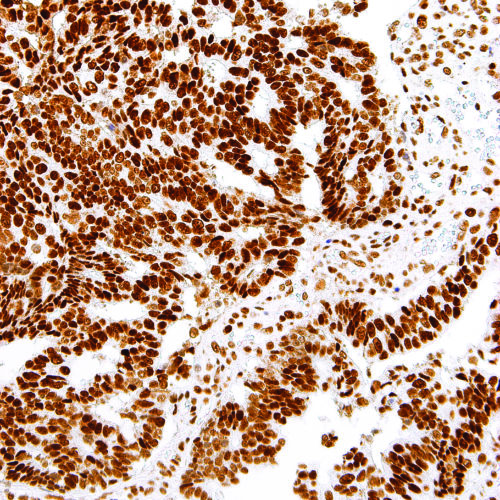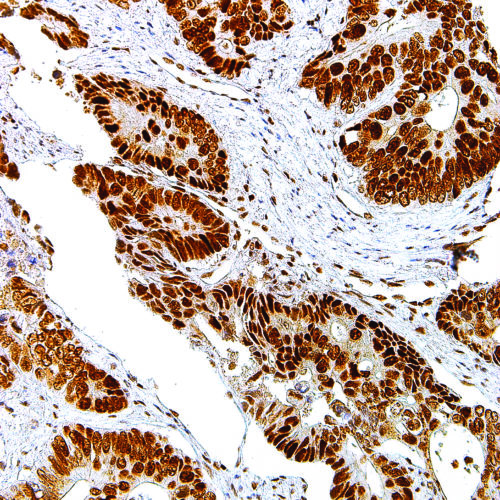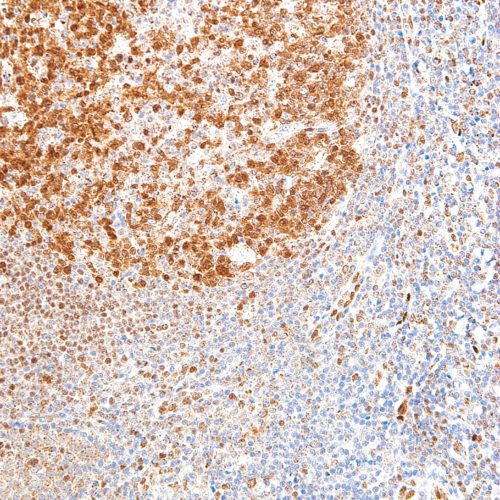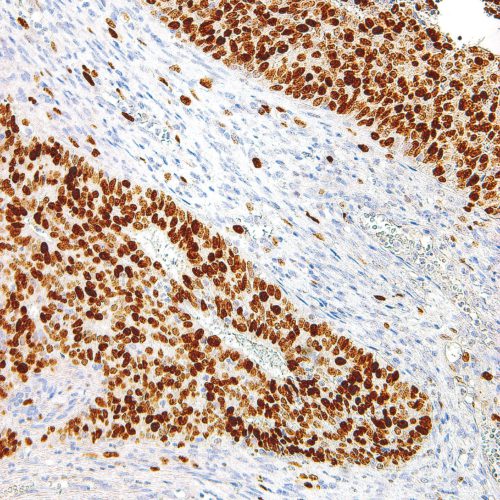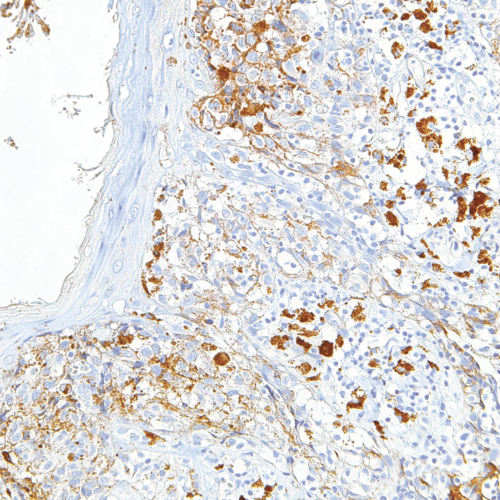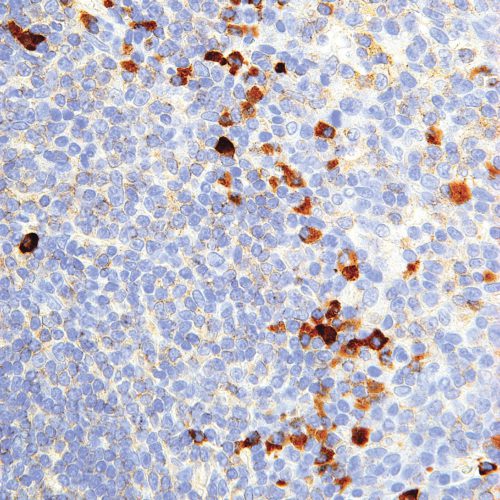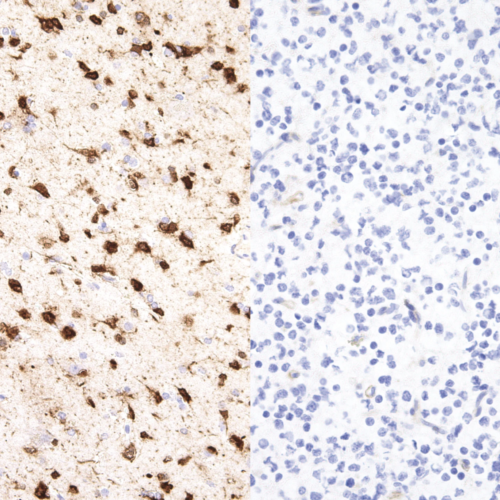High quality products to support Pathologists and Biological and Environmental Scientists
GeneAb™ MUC1
$80.00 – $300.00Mucin 1 (MUC1) is a membrane-bound glycoprotein involved in a number of protective and cell-signaling functions, including cell-cell adhesion, proliferation, motility, invasion, and survival. Overexpression of MUC1 is clinically indicated in breast carcinomas, papillary thyroid carcinomas, and thymic carcinomas, and reports have named MUC1 as a useful marker for differentiating thymic carcinoma from type B3 thymoma. The expression of MUC1 is correlated with the grade of malignancy in thymic epithelial tumors, and loss of MUC1 expression has been associated with reactive gastropathy. MUC1 is not expressed in normal human epidermis, but has been detected in the epidermis of psoriatic plaques of biopsies from patients diagnosed with psoriasis vulgaris.
GeneAb™ MSH2
$60.00 – $250.00MutS Homolog 2 (MSH2) is a protein involved in the mismatch-repair pathway. This protein is commonly associated with hereditary non-polyposis colorectal cancer, and mutations in this gene are correlated with the development of sporadic colorectal carcinoma. Expression levels of MSH2 are abnormally low in a high percentage of patients with microsatellite instability, as well as endometrial and ovarian cancers. Use of Anti-MSH2 is optimized when paired in an IHC panel with antibodies against MSH6, MLH1, and PMS2. Reports have shown Anti-MSH2 to be useful in the detection of the protein in a number of normal and neoplastic tissues, and for identifying a loss of MSH2 in tumors that are microsatellite-unstable.
GeneAb™ MLH1
$95.00 – $455.00MutL Homolog 1 (MLH1) is a protein involved in the mismatch-repair pathway. This protein is commonly associated with hereditary non-polyposis colorectal cancer, as the MLH1 gene is frequently mutated in patients with this cancer. Studies have shown MLH1 to be deficient in a high percentage of patients with microsatellite instability, as well as endometrial and ovarian cancers. Use of Anti-MLH1 is optimized when paired in an IHC panel with MSH6, MSH2, and PMS2. Anti-MLH1 is useful in the detection of MLH1 in a number of normal and neoplastic tissues, and for identifying a loss of MLH1 in tumors that are microsatellite-unstable.
GeneAb™ LMO2
$110.00 – $500.00LMO2, also known as LIM-Only transcription factor 2, RBTN2, or TTG2, is an oncoprotein that is expressed in normal germinal center B-cells, as well as bone marrow hematopoietic precursors and endothelial cells. LMO2 plays a role in angiogenesis and hematopoesis, and its expression has been detected in erythroid and myeloid precursors, megakaryocytes, and also in lymphoblastic and acute myeloid leukemias. LMO2 protein expression has been noted in diffuse large B-cell lymphoma, the most common adult non-Hodgkin lymphoma, as well as follicular lymphoma, a neoplasm derived from germinal center B-cells that accounts for a number of cases of non-Hodgkin lymphomas.
GeneAb™ Ki-67
$75.00 – $340.00Ki-67 is a nuclear, non-histone protein that is expressed only during active phases of the cell cycle (G1, S, G2 and M), but not in the resting phases (G0 and G1 early phase). Although the antigen has also been associated with ribosomal RNA transcription, it is strongly linked to cell proliferation and has thus been indicated as an effective marker in grading the proliferation rate of tumors, including those of the brain, breast, cervix, and prostate.
GeneAb™ KBA.62 (Melanoma Associated Antigen)
$100.00 – $370.00KBA.62, also known as Melanoma Associated Antigen, is used to detect an antigen present in melanocytic tumors, such as melanomas, due to its proven sensitivity and specificity. The antibody can also be used to distinguish between junctional nevus and intradermal nevus cells, and fetal melanocytes versus normal adult melanocytes. Studies have shown KBA.62 to be highly useful in differentiating between metastatic amelanotic melanoma and a number of poorly differentiated carcinomas, large cell lymphomas, sarcomas, and spindle cell carcinomas.
GeneAb™ Kappa
$35.00 – $140.00Anti-Kappa recognizes surface immunoglobulin on normal and neoplastic B-cells, and has been indicated as a potential aid in the identification of leukemias, plasmacytomas, and certain non-Hodgkin’s lymphomas, where the expression of a single light chain class is restricted. The determination of light chain ratio is critical in evaluating B-cell neoplasms, as the majority of B-cell lymphomas express either kappa or lambda light chains, while a mixture of kappa and lambda is characteristic of reactive proliferations. In paraffin-embedded tissue, Anti-Kappa displays strong staining of kappa-positive plasma cells, as well as cells that have absorbed exogenous immunoglobulins.
GeneAb™ IDH1 R132H
$140.00 – $545.00Isocitrate Dehydrogenase 1 (IDH1) is a soluble, cytosolic enzyme involved in the TCA metabolic cycle. The most notable mutation in this enzyme, R132H, is clinically indicated in the majority of astrocytomas and oligodendroglial tumours, with the mutation being associated with more favourable prognosis and increased survival in those patients. IDH1 R132H is also useful in the differential diagnosis between anaplastic glioma and glioblastoma.
